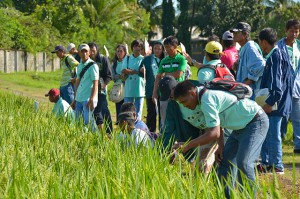A season-run Farmers’ Field School (FFS) had improved the practices and knowledge of rice growers in Victoria, Tarlac. 
Charisma Love Gado, senior science research specialist at Philippine Rice Research Institute, found that farmer-cooperators of an International Fund for Agricultural Development (IFAD)-funded project became more skilled, knowledgeable, and confident after project implementation.
According to Gado, the rice sector banks on extension as a pathway in increasing productivity as it can influence rice yield by at least 15 percent. Under the Improving Livelihoods and Overcoming Poverty in the Drought‐prone Lowlands of South and Southeast Asia project of IFAD, farmers’ capacity in the rainfed areas are enhanced through interventions including the FFS.
“Although Tarlac farmers are into rice production for an average of 20 years, they still rely on technicians when it comes to rice information. But after joining the FFS, farmers claim that they now ‘have the knowledge of some of their technicians,’ which complements their experience,” Gado said.
In her interviews with the farmers, she found that rice tillers gained more knowledge on pest and disease management, nutrient management, and varieties and certified seeds.
FFS facilitators taught farmers the integrated pest management, a practice that discourages the nonstop use of pesticides; Leaf Color Chart, a four-stripped plastic “ruler” used in assessing nitrogen status of rice plant; and certified seeds, which can improve yield by 10 percent.
“Although the farmer-cooperators’ average age is 44, they did not hesitate to try the new recommendations they learned from the FFS and implemented changes in their farming traditions. After joining the project, farmers made significant changes in their land preparation, crop establishment, and management of pests, nutrient, and water,” she said.
The development communication specialist also noted that farmers developed a sense of discipline in farming as they have learned the value of regularly monitoring their field.
Farmers also said that they previously learned few information but have difficulties recalling them. By attending FFS classes, however, they said that their stock knowledge were refreshed and updated.
“My results show that farmers are quick to learn with field monitoring, tour, and video showing. For them, the FFS serves as their guide in rice farming and a way in becoming an expert and in improving their quality of life,” she said.




